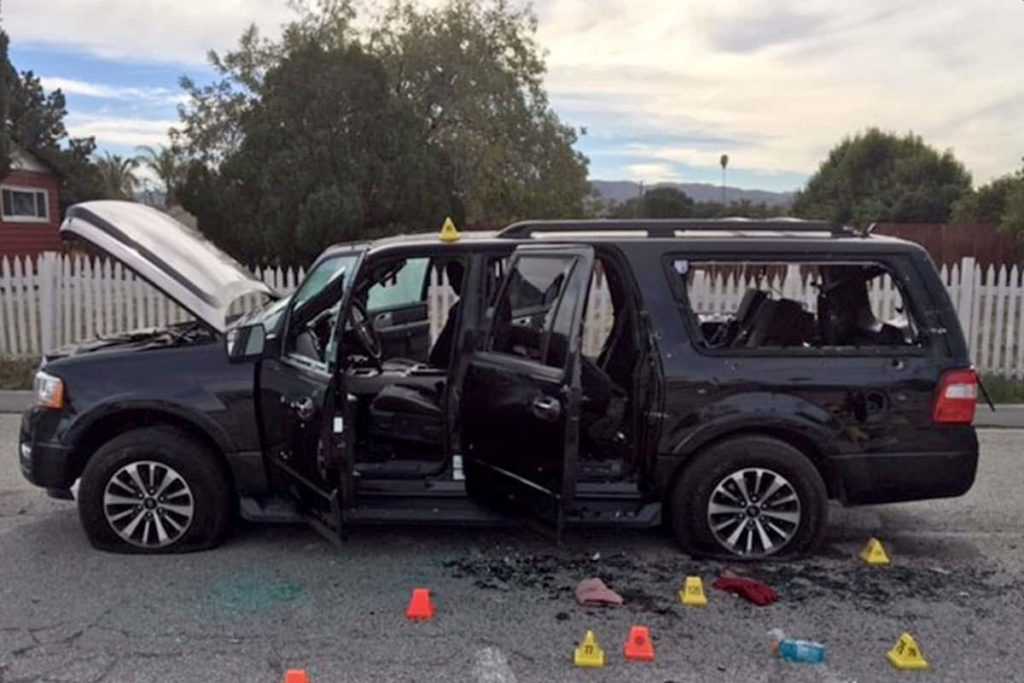Mother of San Bernardino terrorist pleads guilty
The mother of San Bernardino terrorist who herself had ties to an Islamist group has pled guilty to attempting to cover up her son’s role in the terror attack which killed 14 people. Rafia Sultana Shareef, mother of San Bernardino shooter Syed Rizwan Farook is expected to face no more than 18 months in prison according to a Department of Justice press release.

The mother of San Bernardino terrorist who herself had ties to an Islamist group has pled guilty to attempting to cover up her son’s role in the terror attack which killed 14 people. Rafia Sultana Shareef, mother of San Bernardino shooter Syed Rizwan Farook is expected to face no more than 18 months in prison according to a Department of Justice press release.
Upon learning that law enforcement had identified her son as one of the shooters, Shareef allegedly shredded a map Farook had created which she believed was tied to the attack, according to the DOJ. Shareef maintains that she was previously unaware that her son and his wife, Tashfeen Malik, were intending to commit the terror attack that killed 14 people and wounded at least 22 others.
Shareef received attention in the media after journalist Chuck Ross noticed a certificate of appreciation naming Shareef from the Sister’s Wing of the Islamic Circle of North America in live video taken from the Farook house. Then Attorney General Loretta Lynch later confirmed that Shareef was under investigation, after law enforcement revealed bomb-making material and thousands of rounds of ammunition were stockpiled at Farook’s house, raising questions about what Shareef knew.
The Islamic Circle of North America is a branch of the Islamist group Jamaat-e-Islami and has been accused of engaging in material support for terrorism on several occasions.
Jamaat-e-Islami, based in the Indian subcontinent but with branches in many western countries, has long maintained ties to terrorist groups. The group’s military wing Hizbul Mujahedeen was designated as a terrorist organization by the State Department under the Trump administration.
Shareef is far from the first person associated with ICNA to face jail time. In September of 2019, ICNA official Fareed Ahmed Khan was convicted of lying to the FBI about his role in a scheme to ship medical equipment to Pakistan during a terrorism investigation. In September of 2016, New York City bomber Ahmad Khan Rahami attended a New York City mosque led by an ICNA official. In August of 2016, former ICNA Youth Coordinator Erick Jamal Hendricks of Charlotte, N.C. was arrested on charges of conspiring to set up an ISIS cell and sentenced to 15 years in prison. In 2015, Noelle Velentzas, who previously was housed at an ICNA Relief shelter and later spoke at the organization’s fundraising events, was charged as part of a bombing plot in support of ISIS.
The repeated ties between ICNA supporters and jihadist terrorism is reflective of the reality that Islamist groups, even those which are not overtly violent, frequently serve as a conveyor-belt to jihadist terror. This view was confirmed by the Tony Blair Institute for Global Change, which showed that in a study of one-hundred jihadists, “Fifty-one per cent of the jihadis profiled had non-violent Islamist links before joining violent movements. One in four had links to the Muslim Brotherhood or affiliated organisations.”
The plea deal with Rafia Sultana Shareef highlights the reality that jihadist terrorists like the San Bernardino shooters rely on a broader community of Islamist supporters, frequently including family members, who often share their ideology, and can be counted on to ignore or cover up their crimes. Despite this, it can often be hard to prosecute these individuals. In March 2018 the U.S. government failed to convict Noor Salman, the wife of Pulse Night Club attacker Omar Mateen, on charges of material support for terrorism and obstruction of justice.
Law enforcement investigating cases with possible links to jihadist terror should be guarded in their approach to family members, particularly if there is evidence of a shared ideological affinity. This necessitates that law enforcement be properly trained to recognize Islamist group ties and ideological signifiers.
- Anarchists call for solidifying gains, expanding violent insurgency - February 5, 2026
- Shideler: Resistance to Immigration Enforcement Is Fierce in Minnesota - February 2, 2026
- The Revolution Is On in Minnesota - January 26, 2026
